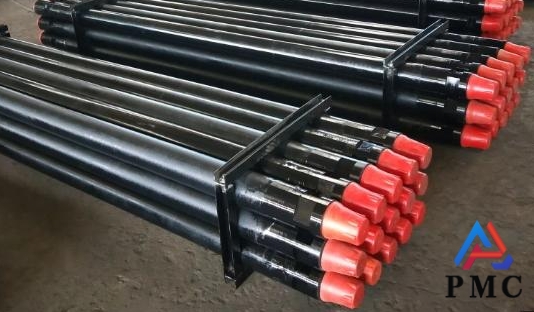
Is the Thicker the Drill Pipe, the Better?
The drill pipe is the basic component of the drill string. It is made of seamless steel tube (the wall thickness is generally 7~12mm). Its main function is to transmit torque and transport drilling fluid, and the wellbore is deepened by gradually lengthening the drill pipe. The thicker the drill pipe, the better it is. Although thicker drill pipe has certain advantages in some aspects, it also has some limitations. Whether it is suitable needs to be considered comprehensively from many aspects. The following is a specific analysis:
Advantages of thicker drill pipes
1. Higher strength: In oil and natural gas drilling operations, the drill pipe needs to withstand a variety of complex external forces such as huge axial tension, torque, and lateral pressure from the formation. Thicker drill pipe walls mean a larger cross-sectional area, which can provide higher tensile strength, compressive strength and torsional strength, thereby more effectively resisting these external forces and reducing the risk of deformation, breakage and other failures of the drill pipe during the drilling process. It is especially suitable for deep well drilling, drilling in complex formations and other working conditions that require extremely high drill pipe strength.
2. Strong wear resistance: During the drilling process, the drill pipe will constantly rub against the well wall, rock debris, etc. The thicker drill pipe wall is relatively less likely to be worn and penetrated, which can extend the service life of the drill pipe to a certain extent, reduce the frequent replacement due to wear, and improve the continuity and efficiency of drilling operations.

Limitations of thicker drill pipes
1. Increased weight: The increase in drill pipe thickness will inevitably lead to an increase in its weight per unit length, which will bring a greater load to the drilling equipment. During the process of pulling out and drilling down, greater lifting and lowering force is needed to operate the drill pipe, which requires higher power for equipment such as drilling winches, which may exceed the rated load capacity of the equipment and affect the normal operation and service life of the equipment. Moreover, an overweight drill rod is more likely to cause safety accidents during operation, such as the drill pipe falling.
2. Rising costs: On the one hand, the manufacture of thick-walled drill pipes requires more raw materials, which directly increases material costs; On the other hand, due to the increase in wall thickness, the processing and manufacturing process of the drill pipe, such as forging, heat treatment, surface treatment, etc., may require more complex processes and more energy consumption, resulting in a corresponding increase in processing costs.
3. Impact on drilling fluid circulation: The inside of the drill pipe is the channel for drilling fluid circulation. Thicker drill pipe walls will reduce the flow area of the drilling fluid and affect the circulation efficiency of the drilling fluid. During drilling operations, the drilling fluid needs to promptly remove the heat generated by the drill bit and carry the cuttings out of the wellhead. If the drilling fluid does not circulate smoothly, it may cause problems such as drill bit overheating and cuttings accumulation, thereby affecting the drilling efficiency and the service life of the drill bit.
Read more: Common Problems and Solutions for Drill Pipes Inspection


